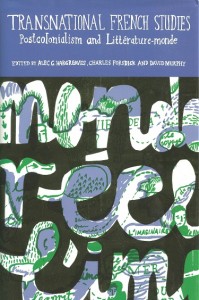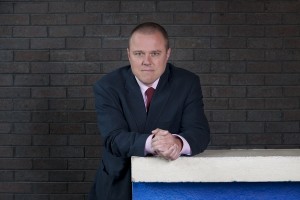Despite, or because of, current challenges facing the sector, the newly launched Institute of Modern Language Research (IMLR) is determined to emphasise the pivotal role of modern languages in humanities research. This is due to the obvious multilingualism, internationalism and interdisciplinarity of its work, but also to the fact that its research agendas, along with the professional identities it creates, are marked and shaped by fundamental questions concerning: cultural communication and difference; the local, national and global; the relationships between history, place, and cultural and textual production.
On Saturday, 7 December 2013 IMLR will launch with a special conference to discuss and debate modern languages in the UK. We sat down to talk with Charles Forsdick, the James Barrow Professor of French at the University of Liverpool and President of the Society for French Studies to find out more.
Thank you for taking the time to talk with us Charles. First of all, could you tell us a bit more about yourself and your area of research?
I locate myself firmly as a modern linguist, with modern languages understood in Mary Louise Pratt’s terms as ‘knowing languages and of knowing the world through languages’. One of the most important elements of the Worton report for HEFCE in 2009 on ‘Modern Foreign Languages provision in higher education in England’ was the observation that we need to construct a specialism that federates those who work across a range of languages and cultures, manages to articulate a common identity based on shared concepts and methods – and that generates as a result a unified idea of languages that we can share with those within and outwith the academy.
Michael Worton’s first recommendation was a compelling one, that we should ‘promote a clear and compelling identity for modern foreign languages as a humanities discipline’. For too long, the label ‘modern languages’ (from which the ‘foreign’ has thankfully been dropped) has designated institutional structures imposed from outside as a result of rationalisation and reorganisation rather than the urgent, lively and research-led intellectual project the discipline really deserves to be.
That said, I also remain firmly committed to working in the sub-field of French studies. My continued engagement in that area is only possible through an active interrogation of cultural formations and objects of study that are seen as postcolonial, transnational and translingual – and that allow us to understand French, France, Frenchness and the wider Francosphere contrapuntally in relation to other cultures and language traditions. I aim to practise a modern languages and a French studies characterised by a genuine, and often disruptive, openness to other specialisms and fields. As a result, I greatly value my many longstanding conversations and highly productive collaborations with scholars in fields such as post-colonialism, studies in travel writing, Caribbean studies, studies in slavery and comparative literature.
The study of modern languages is essential to the development of intercultural knowledge and of an awareness of the complexity of other cultures
Why do you think that the study of modern languages is so important?
I believe firmly in the notion of post-monolingualism, and in the idea that the twenty-first century will be a period in which the monolingual myths that have long connected and privileged single languages, nations and identities will collapse. Most non-Western cultures have always accepted their inherent multilingualism, even during periods of colonial domination, and we are now seeing Western countries themselves actively acknowledging not only the historical range of languages they contain, but also the arrival of new languages – and the emergence of new linguistic practices that these imply.
The challenge remains that multilingualism – or at least the presence of multiple languages – is still too often seen as a problem rather than an opportunity; I am similarly frustrated by the ability of too many  universities in the UK to develop internationalisation strategies without having complementary language strategies. There is a constant need to make a firm and convincing case for the contribution that language departments make to the strategic aims of our institutions and of the Higher Education sector more generally.
universities in the UK to develop internationalisation strategies without having complementary language strategies. There is a constant need to make a firm and convincing case for the contribution that language departments make to the strategic aims of our institutions and of the Higher Education sector more generally.
In all of these debates, modern languages have an important role to play, not only in challenging monolingual assumptions and in continuing to train in each generation a group of linguistically savvy specialists – experts in the languages they study as well as in language and culture more generally – but also in encouraging more generally understandings of the world through language.
The study of modern languages is essential to the development of intercultural knowledge and of an awareness of the complexity of other cultures; it is also central to self-understanding, and I am strongly committed to developing a self-reflexively ethnographic conception of our field: with appropriate modesty and caution, modern linguists can bring an invaluable outsider perspective to the cultures we research, but we are also in a position to think dialectically and to bring to bear the knowledge we develop in relation to other places in attempts to understand ‘home’. That perspective has major implications for the approaches we adopt and the relationships we assume vis-à-vis what we study.
I have always been deeply suspicious of the persistence in my own sub-field, in French studies, of a certain Francophilia that is too often seen to dictate our relationship to our object of enquiry. Personally, in my own work, I favour what the historian Herman Lebovics has very helpfully called a ‘tough love for France’, an attitude I have always espoused since first approaching the country rather obliquely, via Brittany and the politics of the Breton language movement, in the late 1980s.
Our interview with Charles Forsdick will continue in a second blog post where we will find out what Charles has planned for us at the conference.
Charles Forsdick can be found on Twitter @charlesforsdick and on his blog Translating Cultures. For more information about the (re)launch of the Institute of Modern Languages Research (IMLR) check out the IMLR website, our Pick of the week post, or contact Dr Christopher Barenberg (e-mail: christopher.barenberg@sas.ac.uk; tel: 020 7862 8738)
You can find the first interview (with Paul Julian Smith) here: Part 1 & Part 2


Trackbacks/Pingbacks